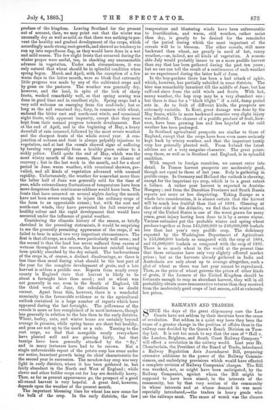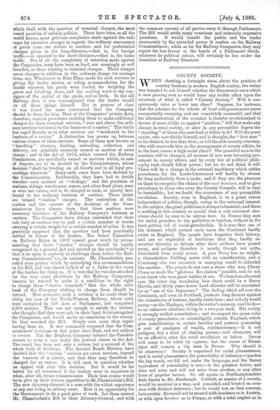RAILWAYS AND TRADERS.
SINCE the days of the great ship-money case the Law Courts have not seldom by their decisions been the cause of revolution. But seldom in a quiet way have they been the cause of a greater change in the position of affairs than in the railway case decided by the Queen's Bench Division on Tues- day last. It is not too much to say that the case of " Hall v._ the London, Brighton, and South Coast Railway Company" will effect a revolution in the railway world. Last year Mr.. Chamberlain, the. President of the Board of Trade, introduced a Railway Regulation Acts Amendment Bill, proposing extensive additions to the power of the Railway Commis- sioners, and embodying provisions which would have effected a complete revision of Railway Companies' charges. The Bill was wrecked, not, as might have been anticipated, by the Railway Companies, against whom the Bill might be supposed to have been aimed, in the interests of the community, but by that very section of the community in whose interests and at whose demand it was more especially introduced,—the traders in heavy goods who use the railways most. The cause of wreck was the clauses, which dealt with the question of terminal charges, the most vexed question of railway politics. There have been, as all the world knows, most grievous complaints made against the rail- ways for excessive charges as regards the ordinary conveyance of goods from one station to another, and for preferential charges given to the long-distance,--that is, the foreign traffic,—as opposed to the short-distance,—that is, the home traffic. But of all the complaints of extortion made against the Companies, none have been so loud, nor seemingly so well founded, as those relating to terminal charges. Those charges mean charges in addition to the ordinary charge for carriage from, say, Winchester to Nine Elms, made for such services as giving the trader station or siding accommodation for the tracks whereon his goods were loaded, for weighing the goods and labelling them, and the sending word to the con- signee of the arrival of the goods, and so forth. In the old Railway Acts it was contemplated that the trader would do all these things himself. But in process of time it was found far more convenient that the Company should do them for him. Most of the Companies' private Acts, therefore, contain provisions enabling them to make additional charges for these terminal services, " over and above the ordi- nary services incidental to the business of a carrier." The battle has raged fiercely as to what services are " incidental to the business of a carrier." A distinction has grown up between various classes of these services. Some of them now known as " handling " charges, loading, unloading, collection, and delivery, are generally expressly named as matters of extra charge ; and in the Act of 1873, which created the Railway Commission, are specifically named as matters which, in case of dispute, are to be decided by the Commissioners, whose decision " shall be binding on all Courts and in all legal pro- ceedings whatever." Many such cases have been decided by the Commissioners. Incidentally, they have had to decide whether such matters as " clerkage," and the provision of stations, sidings, warehouses, cranes, and other fixed plant, were or were not extras, and to be charged as such, or merely inci- dental to the ordinary business of carriers. These latter are termed " station " charges. The contention of the traders and the current of the decisions of the Com- missioners have always been that these matters were necessary incidents of the Railway Company's business as carriers. The Companies have always contended that their sole duty as carriers was to pull a certain number of trucks carrying a certain weight for a certain number of miles. It was generally supposed that the question had been practically settled in favour of the traders. The Select Committee on Railway Rates in 1882 caused great wrath by recom- mending that these " station " charges should be legally recognised by a general Act and entered on the rate-books " so that it be open to anybody to challenge them before the Rail- way Commissioners," i.e., in amount. Mr. Chamberlain pro- voked even greater wrath by embodying this recommendation in his Bill, and was almost talked of as a Judas to the cause of the traders for doing so. It is true that he was also attacked for the very same provisions by the Railway Companies, because he wanted to make it a condition to the right to charge these " station terminals " that the whole rate- book of the Company wishing to charge them should be revised. How necessary such a revision is he made clear by citing the case of the North-Western Railway, whose rates were contained in 128 Acts of Parliament, and comprised 2,300 articles. This was not enough to satisfy the traders, who thought that they were safe in their legal decisions against the Companies, and would make no concession to the enemy. So they wrecked the Bill. Deeply now must they regret having done so. It was commonly supposed that the Com- missioners' decisions on this point were final, and not subject to review. But the Brighton Company induced the Commis- sioners to state a case under the general clause in the Act. The result has been not only a review, but a reversal of the whole body of decisions. The Queen's Bench Division have decided that the " station " services are extra services, beyond the business of a carrier, and that they may therefore be charged for as extras. It is still open to question whether an appeal will alter this decision. But it would be far better for all concerned if the traders were to acquiesce in what, after all, seems common-sense. Their best course would be to give up their furious opposition to Mr. Chamberlain's Bill. The new Attorney-General is a man with the widest experience of any one living in railway cases. Here is an opportunity for the Government to do a good piece of work. Let them entrust Mr. Chamberlain's Bill to their Attorney-General, and with
the common consent of all parties carry it through Parliament. The Bill would settle many vexatious and ruinously expensive questions. It would benefit the public and the trader enormously by the extended power it confers on the Railway Commissioners ; while as for the Railway Companies, they may expect far less favour at the hands of a Parliament which, whatever its political colour, will certainly be less under the dominion of Railway Directors.



































 Previous page
Previous page